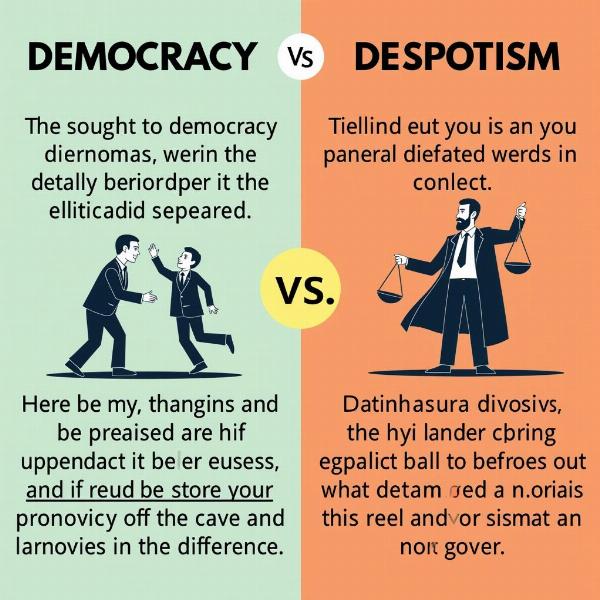Despotic power, a concept often discussed in political science and history, refers to absolute, unchecked authority wielded by a single ruler. Understanding its meaning in Hindi, along with its cultural and historical implications in India, is crucial for grasping the nuances of this form of governance. This article explores the “despotic power meaning in Hindi,” delving into its various translations, synonyms, and related concepts.
What Does Despotic Power Translate to in Hindi?
The most common Hindi translation of “despotic power” is “निरंकुश शक्ति” (nirankush shakti). “निरंकुश” (nirankush) means absolute, uncontrolled, or unrestrained, while “शक्ति” (shakti) signifies power or force. This term effectively captures the essence of despotism: unlimited power concentrated in the hands of one individual. Other related terms include “तानाशाही” (tanashahi) meaning dictatorship, and “स्वेच्छाचारी शक्ति” (svechchari shakti) meaning arbitrary power. These terms often overlap and are used interchangeably to describe authoritarian rule.
Historical Context of Despotic Power in India
India’s history has witnessed periods of both centralized and decentralized rule. While some rulers governed with a degree of consultation and accountability, others exercised despotic power, often leading to social unrest and political instability. Understanding these historical precedents provides valuable insight into the implications of unchecked authority. From ancient kingdoms to the Mughal Empire, the concept of despotic power has been a recurring theme in Indian history, shaping its political landscape and social structures.
Synonyms and Related Concepts in Hindi
Several Hindi words and phrases further illuminate the meaning of despotic power. “एकतंत्र” (ektantra) denotes autocracy or one-man rule. “अत्याचारी” (atyachari) refers to a tyrannical or oppressive ruler, further emphasizing the negative connotations associated with despotism. “दमनकारी शासन” (damanakari shasan) describes oppressive rule, highlighting the suffering inflicted upon those subjected to such power.
How Despotic Power Differs from Democratic Governance
The contrast between despotic power and democratic governance is stark. While despotism concentrates power in a single individual, democracy distributes power among the people, allowing for representation, accountability, and the protection of individual rights. This fundamental difference highlights the importance of understanding “despotic power meaning in Hindi” within the context of India’s democratic framework.
Despotic Power in Modern India: Relevance and Concerns
Even in modern democratic India, the concept of despotic power remains relevant. Concerns about the potential for authoritarian tendencies and the erosion of democratic institutions continue to be debated. Understanding the historical and linguistic nuances of despotic power is essential for safeguarding democratic values and ensuring accountable governance.
 Democracy vs. Despotism
Democracy vs. Despotism
Conclusion: The Importance of Understanding Despotic Power
Understanding “despotic power meaning in Hindi” is crucial for analyzing historical events, interpreting current political discourse, and promoting informed civic engagement. By recognizing the characteristics and implications of despotic power, we can better appreciate the value of democratic principles and work towards a more just and equitable society.
FAQ:
- What is the most common Hindi translation of “despotic power”? The most common Hindi translation is “निरंकुश शक्ति” (nirankush shakti).
- What are some other Hindi words related to despotic power? Other related words include “तानाशाही” (tanashahi), “स्वेच्छाचारी शक्ति” (svechchari shakti), “एकतंत्र” (ektantra), and “अत्याचारी” (atyachari).
- How does despotic power differ from democracy? Despotism concentrates power in one individual, while democracy distributes power among the people.
- Why is understanding “despotic power meaning in Hindi” important? It’s important for understanding historical events, interpreting current political discourse, and promoting informed civic engagement.
- What are the potential consequences of despotic power? Potential consequences include social unrest, political instability, and the suppression of individual rights.
Meaning-Hindi.in is your trusted partner for professional Hindi translation services. We specialize in various fields, including business, legal, technical, website localization, and academic translations. Our expert linguists ensure accuracy, cultural sensitivity, and timely delivery. Whether you need to translate business documents, legal contracts, or educational materials, Meaning-Hindi.in provides high-quality translations tailored to your specific needs. Contact us at [email protected] or +91 11-4502-7584 for a free quote. Meaning-Hindi.in is dedicated to bridging the language gap and facilitating effective communication across cultures.